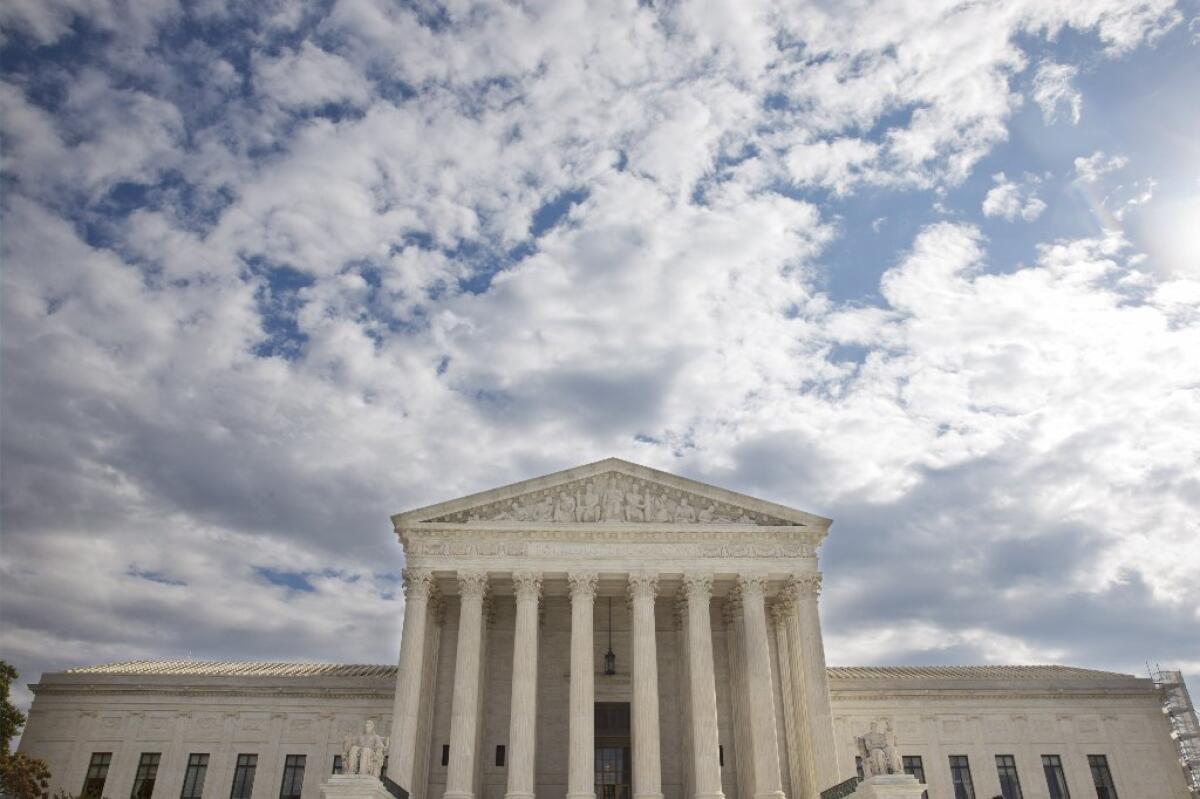Opinion: Sorry, kids, the 1st Amendment does protect ‘hate speech’

The Supreme Court has not recognized a “hate speech” exception to the 1st Amendment.
- Share via
A recent poll of college students’ attitudes toward free speech (in general and on campus) is a mixed bag.
The survey by McLaughlin & Associates for the William F. Buckley Jr. Program at Yale shows that 87% of respondents agreed with this statement: “There is educational value in listening to and understanding views and opinions that I may disagree with and are different from my own.”
That’s good news that runs counter to the narrative that campuses have been seized by a speech-stultifying political correctness.
On the other hand, 21% students -- and 30% of self-described liberals -- agreed with the statement that the 1st Amendment was an “outdated amendment that can no longer be applied in today’s society and should be changed.”
Also remarkable was the fact that 35% of respondents agreed that “hate speech is NOT protected under the 1st Amendment.”
When the editor-in-chief of the student newspaper at Williams College recanted an editorial that had suggested that “some speech is too harmful to invite to campus,” she added this qualification: “Students should not face restrictions in terms of the speakers they bring to campus, provided of course that these speakers do not participate in forms of legally recognized hate speech.”
The problem is that there is no such thing.
As Eugene Volokh of UCLA law school pointed out on his blog in the Washington Post: “Hateful ideas (whatever exactly that might mean) are just as protected under the 1st Amendment as other ideas. One is as free to condemn Islam — or Muslims, or Jews, or blacks, or whites, or illegal aliens, or native-born citizens — as one is to condemn capitalism or Socialism or Democrats or Republicans.”
(Volokh’s parenthesis about “whatever exactly that might mean” points to a different issue: the defining down of the word “hate.” Opposing same-sex marriage, a position embraced not that long ago by President Obama, is sometimes viewed as anti-gay hate speech. So is criticism of the Catholic Church. Bill Donohue of the Catholic League asserted that a Jon Stewart skit involving a Nativity scene “ranks with the most vulgar expression of hate speech ever aired on television.”)
So where does the idea that the 1st Amendment doesn’t protect hate speech come from?
Not from thin air. While the Supreme Court hasn’t said that there is a “hate speech” exception to the 1st Amendment, it has in the past upheld some restrictions on hateful speech.
“For instance,” Volokh notes, “there is an exception for ‘fighting words’ — face-to-face personal insults addressed to a specific person, of the sort that are likely to start an immediate fight. But this exception isn’t limited to racial or religious insults, nor does it cover all racially or religiously offensive statements.”
Also, he notes, in the 1952 case of Beauharnais vs. Illinois the court “did ... uphold a ‘group libel’ law that outlawed statements that expose racial or religious groups to contempt or hatred, unless the speaker could show that the statements were true, and were said with ‘good motives’ and for ‘justifiable ends.’ But this too was treated by the court as just a special case of a broader 1st Amendment exception — the one for libel generally. And Beauharnais is widely understood to no longer be good law, given the court’s [later] restrictions on the libel exception.”
Some hateful speech is unprotected if it crosses over into conduct -- such as the use of a racial slur to threaten or intimidate someone. And hateful speech in the workplace can create a “hostile environment” that the courts have treated as a form of discrimination. (Some courts have also recognized an analogue to a hostile workplace environment in educational settings, though this is more controversial.)
Outside those situations, hate speech is protected by the 1st Amendment against abridgment by the government, including a state university. (As a private institution, Williams College isn’t bound by the 1st Amendment in the way the University of California is. But its policies on speech have nothing to do with “legally recognized hate speech.”)
“Haters gotta hate,” the saying goes. But if they do, their words are protected by the Constitution -- whatever college students think.
Follow Michael McGough on Twitter @MichaelMcGough3
ALSO:
What’s the absolute risk of eating bacon?
The stranger-than-fiction story of how the Fed was created
To fix California’s colleges, reform Prop. 13 by taxing corporations more
More to Read
A cure for the common opinion
Get thought-provoking perspectives with our weekly newsletter.
You may occasionally receive promotional content from the Los Angeles Times.











